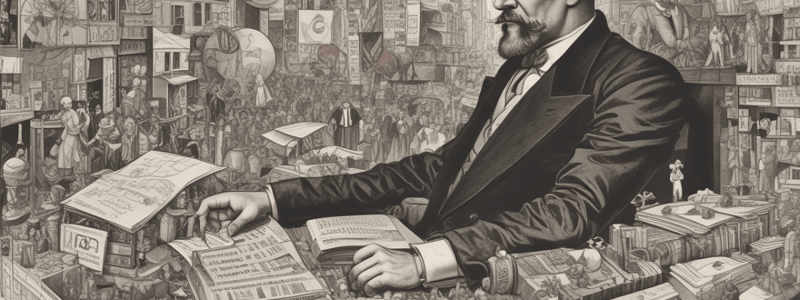Podcast
Questions and Answers
What is the primary focus of Max Weber's study of modernity?
What is the primary focus of Max Weber's study of modernity?
- The rise of modern capitalism (correct)
- The impact of Protestantism on social change
- The emergence of the bourgeois class
- The development of inner-worldly asceticism
What is the term used to describe the Calvinist doctrine of applying spiritual values to secular activities?
What is the term used to describe the Calvinist doctrine of applying spiritual values to secular activities?
- Elective affinity
- Vocation (correct)
- Inner-worldly asceticism
- Predestination
What is the result of applying Calvinist inner-worldly asceticism to the economic sphere of activity?
What is the result of applying Calvinist inner-worldly asceticism to the economic sphere of activity?
- The emergence of the bourgeois class
- The rise of modern capitalism (correct)
- The spread of Protestantism
- The development of predestination
What is the term used to describe the process of identifying social 'idealtypes' necessary for the existence of a phenomenon?
What is the term used to describe the process of identifying social 'idealtypes' necessary for the existence of a phenomenon?
What is the characteristic of the Protestant (work) ethic that contributed to the emergence of modern capitalism?
What is the characteristic of the Protestant (work) ethic that contributed to the emergence of modern capitalism?
What is the lasting effect of applying Calvinist inner-worldly asceticism to the economic sphere of activity?
What is the lasting effect of applying Calvinist inner-worldly asceticism to the economic sphere of activity?
What is the concept of 'elective affinity' referring to in the context of Max Weber's study of modernity?
What is the concept of 'elective affinity' referring to in the context of Max Weber's study of modernity?
What is the primary factor that contributed to the spread of Protestantism in the 17th century?
What is the primary factor that contributed to the spread of Protestantism in the 17th century?
What is the main focus of Max Weber's study of modernity?
What is the main focus of Max Weber's study of modernity?
What is the term used to describe the values and beliefs of Calvinism that influenced the rise of modern capitalism?
What is the term used to describe the values and beliefs of Calvinism that influenced the rise of modern capitalism?
What is the primary methodology used by Max Weber to analyze culture and social change?
What is the primary methodology used by Max Weber to analyze culture and social change?
What was the primary consequence of the break-up of the medieval order with the rise of Protestantism?
What was the primary consequence of the break-up of the medieval order with the rise of Protestantism?
What was the role of culture according to Weber?
What was the role of culture according to Weber?
What was the effect of modern rationalization processes on society?
What was the effect of modern rationalization processes on society?
What characterized medieval culture according to Weber?
What characterized medieval culture according to Weber?
What is a key concept in Weber's interpretative methodology?
What is a key concept in Weber's interpretative methodology?
What is a consequence of inner-worldly asceticism?
What is a consequence of inner-worldly asceticism?
Max Weber believed that rationalization processes helped develop the uniquely eastern creation of theoretically organized science with universal empirical validity.
Max Weber believed that rationalization processes helped develop the uniquely eastern creation of theoretically organized science with universal empirical validity.
Rationalization is the central thread linking the rise of capitalism with its development, and with its other lasting effects including secularization and materialism.
Rationalization is the central thread linking the rise of capitalism with its development, and with its other lasting effects including secularization and materialism.
Weber saw the modern Western world as the “decreasing rationalization of more and more areas of life”.
Weber saw the modern Western world as the “decreasing rationalization of more and more areas of life”.
Rationalization led to the growth and power of bureaucracy as a form of organization in both capitalism and communism.
Rationalization led to the growth and power of bureaucracy as a form of organization in both capitalism and communism.
Modern bureaucracies can provide a solution to the problem of theodicy.
Modern bureaucracies can provide a solution to the problem of theodicy.
The construction of modern science as a cultural form of universal value and significance is a claim to represent the only possible form of a reasoned view of the world.
The construction of modern science as a cultural form of universal value and significance is a claim to represent the only possible form of a reasoned view of the world.
Max Weber's concept of 'elective affinity' refers to the attraction between a socioeconomic group and its way of life.
Max Weber's concept of 'elective affinity' refers to the attraction between a socioeconomic group and its way of life.
The rise of modern capitalism was a direct result of the Protestant Reformation.
The rise of modern capitalism was a direct result of the Protestant Reformation.
Weber's interpretative-analytical model focuses on the role of cultural values in shaping economic activity.
Weber's interpretative-analytical model focuses on the role of cultural values in shaping economic activity.
Rationalization and disenchantment are two consequences of the rise of modern science.
Rationalization and disenchantment are two consequences of the rise of modern science.
Instrumental rationality is a characteristic of medieval culture.
Instrumental rationality is a characteristic of medieval culture.
The construction of modern science is closely tied to the rise of modern capitalism and bureaucracy.
The construction of modern science is closely tied to the rise of modern capitalism and bureaucracy.
Max Weber believed that the Enlightenment wanted to replace religion with science as a basis for moral values.
Max Weber believed that the Enlightenment wanted to replace religion with science as a basis for moral values.
Weber thought that science could fully address the problems of meaning, suffering, and justice.
Weber thought that science could fully address the problems of meaning, suffering, and justice.
In modern culture, the aesthetic and erotic spheres are fully dominated by technical and scientific rationality.
In modern culture, the aesthetic and erotic spheres are fully dominated by technical and scientific rationality.
Rationalization is a key concept in Weber's analysis of modernity.
Rationalization is a key concept in Weber's analysis of modernity.
The rise of capitalism led to a decrease in the importance of the aesthetic and erotic spheres.
The rise of capitalism led to a decrease in the importance of the aesthetic and erotic spheres.
Weber viewed modernity as unambiguously positive.
Weber viewed modernity as unambiguously positive.
Instrumental rationality is a key feature of modern culture.
Instrumental rationality is a key feature of modern culture.
Weber believed that Protestantism was more accepting of aesthetic forms than Catholicism.
Weber believed that Protestantism was more accepting of aesthetic forms than Catholicism.
The taboo on pleasure and gratification was essential for the rise of capitalism.
The taboo on pleasure and gratification was essential for the rise of capitalism.
Weber saw the aesthetic and erotic spheres as entirely separate from the realm of work.
Weber saw the aesthetic and erotic spheres as entirely separate from the realm of work.
What is the primary characteristic of modern Western capitalism, according to Max Weber?
What is the primary characteristic of modern Western capitalism, according to Max Weber?
How does rationalization affect the growth and power of bureaucracy in modern societies?
How does rationalization affect the growth and power of bureaucracy in modern societies?
What is the significance of modern science in terms of its cultural value and significance?
What is the significance of modern science in terms of its cultural value and significance?
What is the primary feature of instrumental rationality in modern culture?
What is the primary feature of instrumental rationality in modern culture?
How does rationalization contribute to the development of modern science and technology?
How does rationalization contribute to the development of modern science and technology?
What is the relationship between the construction of modern science and the rise of modern capitalism and bureaucracy?
What is the relationship between the construction of modern science and the rise of modern capitalism and bureaucracy?
What is the significance of the 'elective affinity' concept in the context of Max Weber's study of modernity, and how does it relate to the rise of modern capitalism?
What is the significance of the 'elective affinity' concept in the context of Max Weber's study of modernity, and how does it relate to the rise of modern capitalism?
How does Max Weber's concept of rationalization relate to the development of modern capitalism and bureaucracy?
How does Max Weber's concept of rationalization relate to the development of modern capitalism and bureaucracy?
What is the significance of scientific and technological values in the construction of modern science, and how do they relate to the rise of modern capitalism?
What is the significance of scientific and technological values in the construction of modern science, and how do they relate to the rise of modern capitalism?
How does Max Weber's concept of instrumental rationality relate to the rise of modern capitalism and modern culture?
How does Max Weber's concept of instrumental rationality relate to the rise of modern capitalism and modern culture?
What is the significance of the construction of modern science in the context of Max Weber's study of modernity, and how does it relate to the rise of modern capitalism?
What is the significance of the construction of modern science in the context of Max Weber's study of modernity, and how does it relate to the rise of modern capitalism?
How does Max Weber's concept of rationalization relate to the rise of modern capitalism and the decline of traditional values and beliefs?
How does Max Weber's concept of rationalization relate to the rise of modern capitalism and the decline of traditional values and beliefs?
How does Max Weber characterize modern culture in terms of its values and rationality?
How does Max Weber characterize modern culture in terms of its values and rationality?
What role do the aesthetic and erotic spheres play in modern culture according to Weber?
What role do the aesthetic and erotic spheres play in modern culture according to Weber?
What is the significance of instrumental rationality in modern culture?
What is the significance of instrumental rationality in modern culture?
How does Weber view the construction of modern science?
How does Weber view the construction of modern science?
What is the relationship between rationalization and disenchantment in Weber's analysis?
What is the relationship between rationalization and disenchantment in Weber's analysis?
What is the significance of the Enlightenment in Weber's analysis of modernity?
What is the significance of the Enlightenment in Weber's analysis of modernity?
How does Weber characterize the rise of modern bureaucracy?
How does Weber characterize the rise of modern bureaucracy?
What is the significance of the taboo on pleasure and gratification in Weber's analysis?
What is the significance of the taboo on pleasure and gratification in Weber's analysis?
How does Weber view the relationship between Protestantism and the aesthetic and erotic spheres?
How does Weber view the relationship between Protestantism and the aesthetic and erotic spheres?
What is the overall characterization of modernity in Weber's analysis?
What is the overall characterization of modernity in Weber's analysis?
Flashcards are hidden until you start studying




